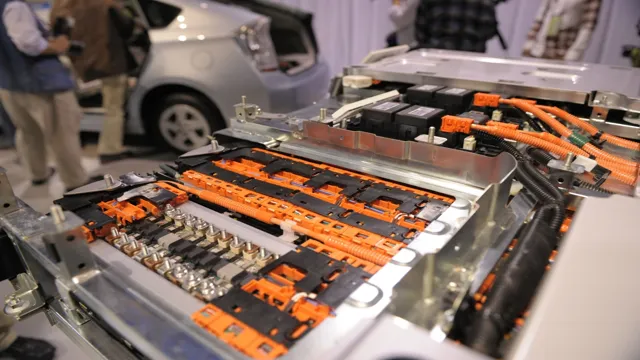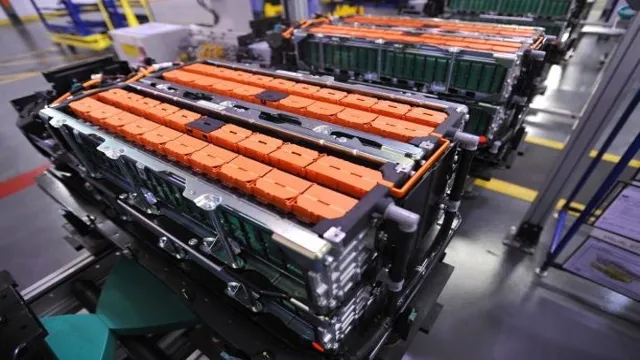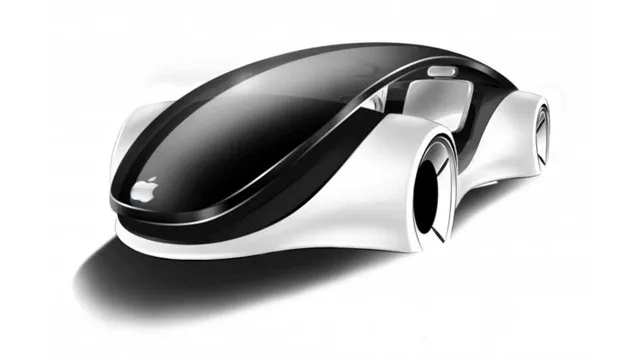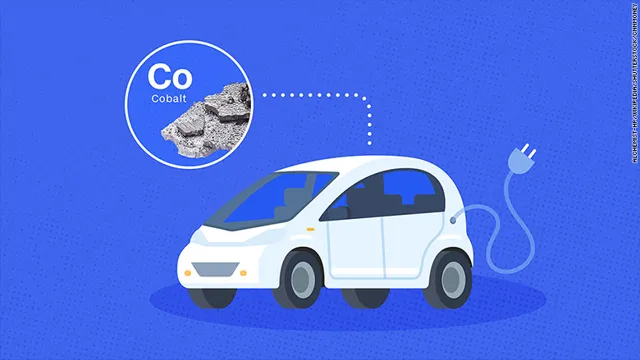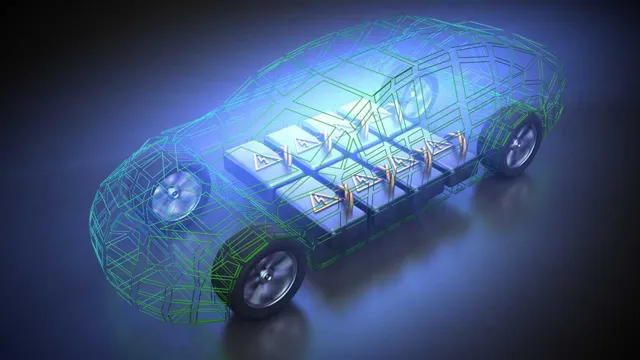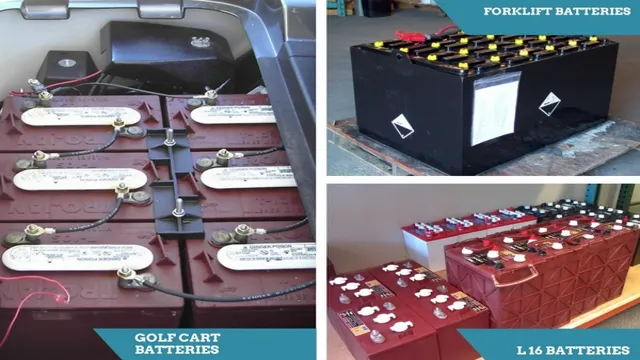Battery-Powered Vehicles: Cleaning Up Our Roads or Polluting Our Air? The Truth About Electric Car Battery Production Pollution
Electric cars are becoming increasingly popular as people are recognizing the need to reduce their carbon footprint. However, there are some concerns about the pollution associated with the production and disposal of electric car batteries. While it is true that the production process for electric car batteries does generate some pollution, it is not as significant as the pollution caused by gasoline-powered vehicles.
In fact, studies have shown that electric cars produce less pollution over their lifetime when compared to traditional cars. One of the main reasons why electric cars are considered to be more environmentally friendly is that they do not produce tailpipe emissions. Unlike gasoline cars, electric cars run on batteries, which means that there are no emissions coming out of the back of the car.
However, it is true that the production of electric car batteries does generate some pollution. This is because the process involves the extraction and processing of raw materials such as lithium, cobalt, and nickel. These materials are often mined in countries with lax environmental regulations, which can lead to significant pollution.
Despite these concerns, studies have shown that electric cars produce less pollution over their lifetime than gasoline cars. This is because electric cars are more energy efficient, which means that they require less energy to travel the same distance. Additionally, the electricity used to power electric cars can come from renewable sources such as wind or solar power.
On the other hand, gasoline cars are responsible for a significant amount of pollution throughout their lifetime, from the drilling and transportation of oil to the combustion of gasoline in the engine. In conclusion, while there is some pollution associated with the production and disposal of electric car batteries, it is not as significant as the pollution caused by traditional gasoline-powered cars. Electric cars are more energy efficient and produce no tailpipe emissions, which makes them a much cleaner and more environmentally friendly option.
As we continue to look for ways to reduce our carbon footprint and protect the environment, electric cars will play an important role in helping us achieve these goals.
Current State of Electric Car Battery Production
As electric cars become increasingly popular, the demand for electric car batteries has skyrocketed. However, the production of these batteries is not without its drawbacks. One major issue is the environmental impact of battery production, which generates pollution and carbon emissions.
The mining of raw materials needed to make the batteries, such as lithium and cobalt, can also have harmful effects on the environment and potentially on local communities. As the industry grows, there is a greater need for sustainable and responsible practices to minimize the negative impact of electric car battery production on the environment. Some electric car manufacturers have made efforts to improve the sustainability of their battery production, including developing closed-loop systems to recycle materials and sourcing materials from ethical suppliers.
Despite these efforts, it is important for consumers to remain aware of the environmental impact of electric car battery production and consider the sustainability practices of the manufacturers they support.
Rising demand for electric car batteries
The demand for electric cars is on the rise, and with it, the demand for their batteries. Currently, the state of electric car battery production is still growing and evolving. However, companies such as Tesla, Panasonic, and LG Chem are leading the charge in production.
Tesla, for example, is building the world’s largest lithium-ion battery factory in Nevada, aptly named the Gigafactory. The factory is expected to produce up to 50 GWh of battery packs per year by 2020, which would be enough to power 500,000 electric cars annually. While the production of electric car batteries is still in its early stages, the growth and innovation within the industry hold promise for a future where electric vehicles become the norm rather than the exception.
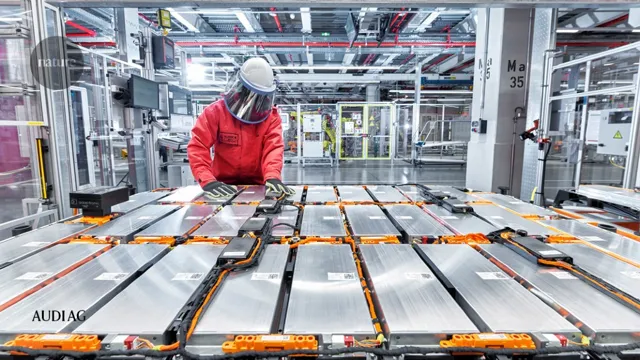
Importance of lithium-ion batteries
The importance of lithium-ion batteries cannot be overstated in the current state of electric car battery production. These batteries are the backbone of the electric car industry, thanks to their high energy density, long cycle life, and ability to hold a charge for extended periods. Lithium-ion batteries also have a low rate of self-discharge, making them ideal for electric vehicles that require a steady supply of power.
Despite their many benefits, the production of lithium-ion batteries still faces some challenges. For instance, the mining of lithium, cobalt, and nickel, which are crucial raw materials for these batteries, continue to have negative effects on the environment. There are also concerns around safety, as lithium-ion batteries can be prone to overheating and fires.
Nonetheless, lithium-ion batteries remain the most viable option for powering electric cars at this time due to their superior energy density, power output, and longevity. With ongoing research and development, improvements in battery technology will continue to address the challenges faced in their production, making electric cars even more mainstream and efficient.
Pollution caused by production
Electric Car Battery Production As the world transitions towards greener modes of transportation, electric cars have become increasingly popular. However, the production of electric car batteries also results in pollution. The production of electric car batteries involves the mining of rare minerals, which results in land degradation and deforestation.
Moreover, the process of extracting and refining these minerals requires a significant amount of energy, which leads to greenhouse gas emissions. Despite efforts to reduce its carbon footprint, the current state of electric car battery production still poses a threat to the environment. This is why manufacturers need to find more sustainable ways to produce these batteries, such as using recycled materials.
By integrating eco-friendly alternatives, we can ensure a future where we can enjoy the benefits of electric cars without sacrificing the environment.
Environmental Impact of Electric Car Batteries
With increasing concern about the environmental impact of traditional fossil fuel vehicles, many people are transitioning to electric cars. While these vehicles offer a more sustainable alternative to conventional gasoline engines, there are concerns surrounding the production of electric car batteries. The manufacturing process of these batteries involves several toxic chemicals and materials like cobalt, nickel, and lithium, which have a significant impact on the environment.
The mining of these metals is energy-intensive and generates a large amount of pollution, including air and water pollution. Additionally, the disposal of batteries after their useful life can also pose environmental challenges, as they contain hazardous materials that can seep into soil and water, causing harm to plant and animal life. While electric cars are a step forward in reducing carbon emissions from transportation, addressing the production and disposal of their batteries is also crucial in achieving a sustainable future.
Carbon footprint of making batteries
Electric car batteries have often been touted as a greener alternative to traditional gasoline vehicles, but the production process of these batteries has a significant environmental impact. The carbon footprint of making batteries is mainly due to the extraction and processing of raw materials required in battery manufacturing, including lithium, cobalt, and nickel. The mining of these materials is energy-intensive and often creates toxic waste, leading to deforestation, soil and water contamination, and air pollution.
Additionally, the production and transportation of the battery components require significant amounts of energy and contribute to greenhouse gas emissions. While electric cars produce less emissions when on the road, the environmental cost of producing their batteries cannot be ignored. As consumers, it is essential to weigh the advantages and disadvantages of electric car ownership, considering the impact of battery production and disposal, as well as other factors such as energy production and charging infrastructure.
Toxic substances produced during production
Electric car batteries are often touted as an environmentally friendly choice, but they do have some negative impacts. One of the biggest issues is the production of toxic substances during the battery manufacturing process. For example, the extraction of lithium, a key component of electric car batteries, can release harmful chemicals and pollutants into the surrounding environment.
Additionally, the production process for other materials used in the manufacturing process, such as the cathodes and anodes, can also generate toxic substances. These substances can have serious effects on both human health and the environment, from contaminating soil and water sources to causing respiratory and neurological problems for nearby communities. It is important to continue researching ways to minimize the environmental impact of electric car batteries to ensure that they are truly a sustainable option for transportation.
Disposal of used batteries
Disposing of used electric car batteries can have a significant environmental impact. While electric vehicles are a cleaner alternative to traditional gasoline-powered cars, their batteries have a limited lifespan of about 8-10 years. Once they reach the end of their useful life, these batteries must be carefully disposed of or recycled to prevent any negative environmental effects.
Recycling these batteries can help reduce the demand for raw materials needed to manufacture new batteries and prevent harmful chemicals from leaching into the environment. However, the recycling process can be expensive and energy-intensive. Additionally, improper disposal of these batteries can lead to toxic chemicals such as lead, sulfuric acid, and lithium leaking into soil and water sources, which can harm both wildlife and humans.
It is crucial for electric car manufacturers and owners to take responsibility for properly disposing of these batteries to minimize their impact on the environment.
Mitigating the Environmental Impact of Electric Car Batteries
The production of electric car batteries has been a cause of concern for environmentalists due to the pollution it creates. However, steps have been taken by car manufacturers to mitigate the impact of battery production on the environment. For instance, some companies are investing in renewable energy sources like solar and wind power to produce electricity for battery production.
Additionally, recycling of battery components is becoming a common practice, reducing the amount of waste that ends up in landfills. The introduction of new technologies such as solid-state batteries, which use fewer toxic materials, is also helping to reduce the pollution associated with battery production. By implementing these measures, the environmental impact of electric car battery production is being mitigated, and car manufacturers are moving towards a more sustainable future.
Recycling technology advancements
The advancement of electric car batteries is undeniable in the modern world. However, the concern of disposing of those batteries in an eco-friendly way is inevitable. As batteries lose their charge, they become hazardous waste that emits harmful chemicals into the environment.
Recycling has become the most cost-effective and eco-friendly way of disposing of used batteries. New technologies and innovations are increasingly emerging as we continue to advance in battery technology. For instance, researchers have found that using bacteria to extract valuable material from used batteries can minimize the environmental impact.
This new method will significantly reduce the energy consumption needed in recycling batteries, making it more efficient and environmentally friendly. As the world continues to shift towards greener energy, advancements in recycling technology for electric car batteries are essential to reduce environmental impacts and ensure sustainability.
Sustainability initiatives by major car manufacturers
As the world transitions to electric cars, major car manufacturers are also taking steps to mitigate the environmental impact of electric car batteries. One such initiative is BMW’s Recycling and Secondary Use program. Through this program, BMW aims to recover and reuse critical materials from used batteries.
General Motors is another car manufacturer that has implemented a similar program, where they both recycle and resell the batteries for secondary use. This not only reduces waste but also reduces the need for new materials to be extracted and processed. It’s great to see car manufacturers taking responsibility for the environmental impact of their products and implementing sustainable practices.
By recycling and reusing electric car batteries, we can reduce our carbon footprint and move towards a more sustainable future.
Conclusion: The Future of Electric Car Batteries and Pollution
In the end, the production of electric car batteries may not be entirely clean and pollution-free. However, when compared to the harmful emissions and pollution caused by gasoline-powered cars, it’s clear that electric vehicles are a step in the right direction. We must continue to invest in cleaner production methods and sustainable energy sources to mitigate any negative impacts of battery production.
Remember, when it comes to the environment, every little bit counts – even the amount of energy it takes to power one tiny battery. So let’s embrace the electric car revolution and drive towards a cleaner, brighter future.”
FAQs
What are some environmental benefits of electric car battery production?
Electric car battery production can lead to a reduction in greenhouse gas emissions, as it reduces the reliance on fossil fuels. Additionally, many batteries are now made with recyclable materials, which helps to reduce waste and minimize the impact on the environment.
Does electric car battery production contribute to pollution?
Like any manufacturing process, electric car battery production can contribute to pollution if not properly managed. However, advancements in technology have allowed for more environmentally friendly methods of production, such as using renewable energy to power production facilities.
What are some challenges associated with the production of electric car batteries?
One of the biggest challenges associated with electric car battery production is the mining of raw materials, such as lithium and cobalt, which can have negative environmental impacts. Additionally, batteries must be manufactured to precise specifications in order to function efficiently and safely.
How do electric car batteries compare to traditional car batteries in terms of environmental impact?
Electric car batteries have the potential to be much more environmentally friendly than traditional car batteries, as they can be charged using renewable energy sources. Additionally, the materials used in electric car battery production are often recyclable, whereas traditional car batteries can be very difficult to dispose of responsibly.
